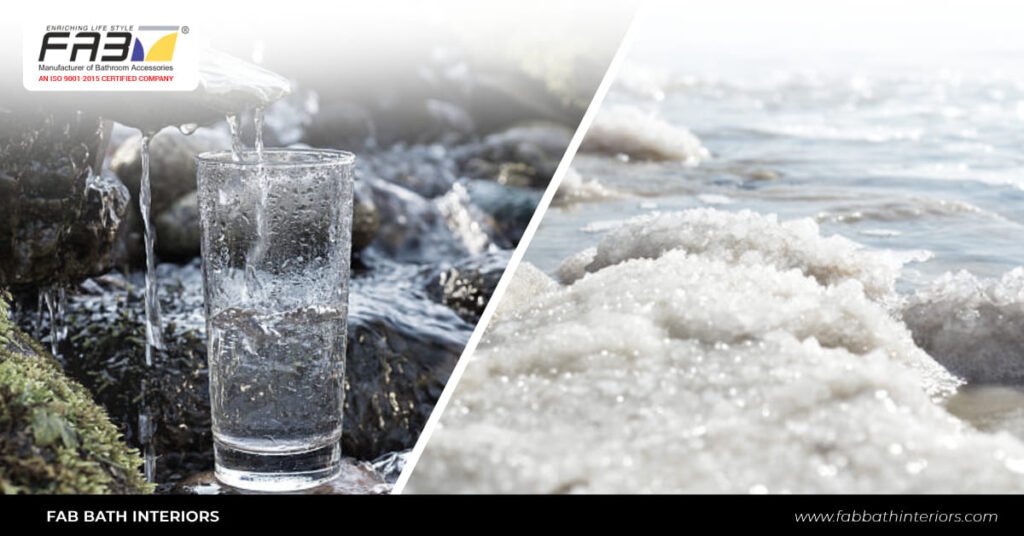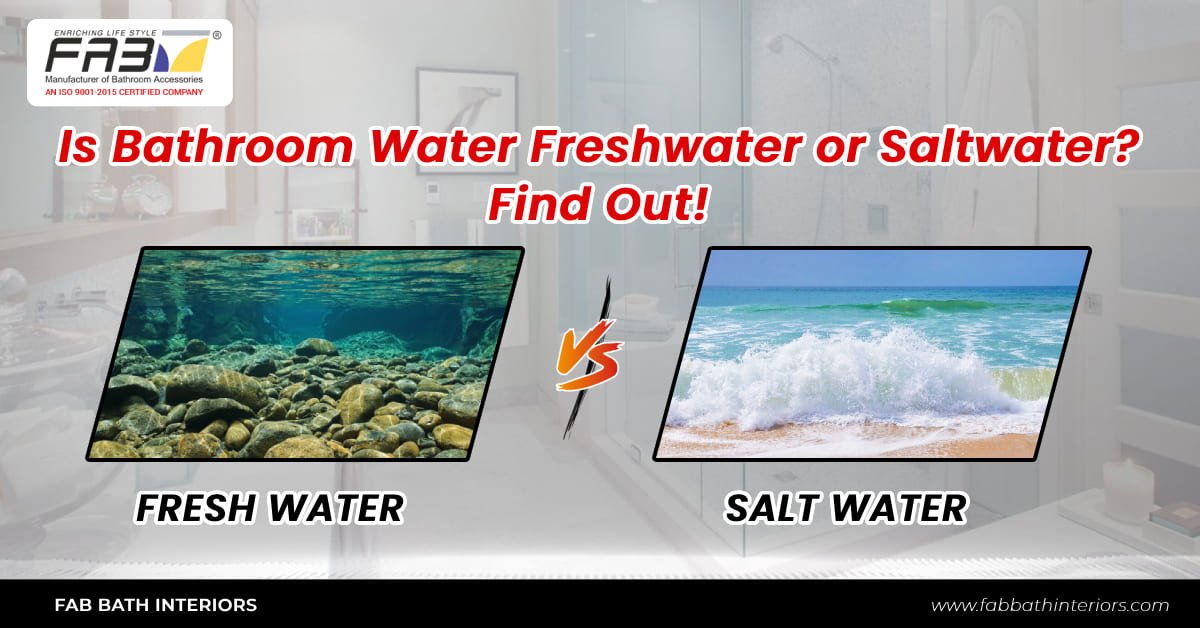The type of water used in our bathrooms varies and can create a big difference in our everyday routines and our health. Although most of us assume that water in our houses is freshwater, there are regions where saltwater is used for certain purposes. The water we use influences not only our daily hygiene but also the condition of our plumbing systems and our general health.
As much as freshwater is widely used, in some regions, saltwater can be used, depending on the purpose or general requirements. In this article, we are going to discuss how bathroom freshwater differs from bathroom saltwater and why freshwater is the most preferred choice for everyone. Read on to learn more about the benefits of fresh water and how it changes your bathroom experience!
Freshwater in Bathrooms
Freshwater is the bathroom water used in most homes. This can be from municipal water systems or private wells. The water used in the house is treated for safety in order to enable basic everyday activities such as bathing, brushing of teeth, and flushing toilets. Freshwater is the first choice for houses because it is safe to use.
The water treatment process ensures the presence of clean water free from harmful contaminants.
The treatment process itself includes filtration, chemical treatment, and testing according to specific quality standards. Freshwater also contains no harmful salts or minerals, which, over time, will cause damage to plumbing systems and fixtures.
Fresh water is also one of the sources of water, and this availability makes it regarded as the most convenient and reliable source of water supply for personal hygiene and sanitation. This aspect supports modern plumbing systems that make it easy to keep bathrooms clean. All these reasons explain why freshwater is the favorite source of water in most homes.
Usage of saltwater in bathrooms
Freshwater is the standard one, but saltwater is used in bathrooms for certain functions. Here are some common uses of saltwater:
- Toilet Flush
Some places use salt water to flush the toilets instead of using freshwater. This way, freshwater can be saved and used for other purposes.
- Cruise Ships
Most of the cruise ships operate on salty water for washing and deck washing. This avoids using large amounts of pure water but, meanwhile, pure water is provided to bathe as well as for drinking.
- Coastal Regions
In a few regions, people drink salty water which they use for their gardening and other cleaning works due to no transport.
Why Can’t Salt Water Be Used Everywhere?
Though it might seem apparent that saltwater is the right replacement, it has some major drawbacks. These are:
• Corrosion
By nature, salt water is highly corrosive. In a plumbing system, corrosion of pipes and fixtures occurs far more rapidly and costs much higher to replace or service.
• Health Issues
Swimming in saltwater leaves behind residues on the skin and hair. It can also cause dryness, redness, or allergies in some people. So, it cannot be used for personal hygiene.
• Maintenance
Saltwater systems are more demanding in terms of maintenance than freshwater systems to prevent scaling and pipe corrosion as well as salt formation on fixtures.
• Water Softening
Saltwater is naturally harder than freshwater, which can lead to soap scum buildup. This can affect the effectiveness of soap, shampoos, and other cleaning products, leading to extra cleaning efforts.
• Environmental Impact
The disposal of saltwater or the consumption in high quantities would lead to environmental impact. High salt levels can have a negative impact on the local environment, primarily when spilled into lakes, rivers, or oceans, and cause interference with flora and fauna life.

Freshwater vs. Saltwater in Bathrooms
The table below highlights the main differences between freshwater and saltwater in bathroom applications:
| Characteristic | Freshwater | Saltwater |
| Source | Municipal systems, private wells | Seawater, brine |
| Usage | Drinking, bathing, toilet flushing | Toilet flushing (in some regions) |
| Corrosiveness | Low | High |
| Health Impact | Safe for skin and hair | Can cause dryness, irritation, residue |
| Maintenance | Regular plumbing maintenance | Requires more maintenance due to scaling and corrosion |
Redefining Luxury with Fab Bath Interiors
At Fab Bath Interiors, we believe that your bathroom needs to function faultlessly and, at the same time, elevate your lifestyle. We range from choosing rich materials to crafting spaces that give you the ideal balance of comfort and style as part of your custom bathroom needs. Here’s a sneak peek into how we redefine luxury for bathroom design:
| Feature | Fab Bath Interiors Touch |
| Design Excellence | Tailor-made bathroom design defined by your personal style. |
| Premium Materials | The best in class tiles, fixtures, and finishes. |
| Smart Technology | Smart taps, lighting, and thermostat. |
| Eco-Friendly Options | Water-saving and eco-friendly materials. |
| Luxury Features | Custom-designed vanities, elegant tubs, and designer showers. |
Conclusion
Therefore, in most bathrooms, freshwater is mainly utilized for various everyday practices, which include bathing, toilet flushing, and washing. In other parts of the country, salt water is utilized specifically to flush toilets and clean them with the primary goal of saving the freshwater.
If you are thinking of renovating your bathroom or are concerned about the quality of your water, consulting a professional is very important. Fab Bath Interiors can design a bathroom according to your requirements while providing you with the best water system in your home. With expert advice and quality materials, Fab Bath Interiors will guide you to create a bathroom that is functional, safe, and sustainable.
FAQs
1. Is the bathroom water safe for drinking?
In most households, bathroom water is fresh and safe to drink. However, in many houses with old pipes or some problems with the quality of the water, it is better not to drink tap water.
2. Why is saltwater sometimes used for toilet flushing in certain areas?
Toilet flushing takes up saltwater in places where there is limited availability of freshwater. This conserves freshwater for uses such as showering and washing teeth.
3. Does saltwater damage pipes?
Yes, saltwater is corrosive compared to freshwater; it corrodes plumbing systems more rapidly than freshwater, thereby making pipes and fixtures deteriorate much faster.
4. Will saltwater work for bathing?
Saltwater can be used for bathing- safely but may leave a sticky residue on the skin and hair. Prolonged exposure can cause dryness and irritation; hence, it’s not suitable for everyone.
5. How to ensure safe bathroom water?
Proper maintenance of your plumbing system, installing water filtration systems, and keeping track of water quality will ensure your bathroom water is safe to use every day.



